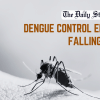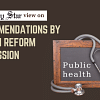Vaccine trial raises hope against dengue

We're delighted to learn of the conclusion of a successful trial of a dengue vaccine in Bangladesh that reportedly showed promising results in fighting against the mosquito-borne disease. According to a study based on the trial, published in The Lancet Infectious Diseases journal, it demonstrated both safety and immune responsiveness in children and adults who participated in it. Specifically, antibodies to all four dengue serotypes were found in most participants after vaccination. This is a crucial result as dengue has multiple serotypes, and an effective vaccine needs to provide protection against all of them.
The successful evaluation of the single-dose vaccine, known as TV005, which was developed by the US National Institutes of Health (NIH), is a remarkable achievement indeed. It offers a glimmer of hope especially for Bangladesh as it faces the most severe dengue outbreak in its history. Bangladesh's participation in what was its second trial has been followed by a third, which is currently underway in India and some other countries. One can only hope that researchers who have collaborated on the project will accelerate the process to make widespread use of the vaccine possible within the shortest period of time.
The need for an effective vaccine for us cannot be overestimated. The lack of a specific drug or vaccine so far meant that fluid management and symptom control, through preventive measures, are the only instruments available to fight dengue. Their effectiveness has been questionable at best, however, with the number of dengue patients hospitalised in Bangladesh this year exceeding two lakh already. So many people have never been infected in a single year before, neither have so many died, as the latest figures show. Until 2023, some 853 people officially died between 2000 – when the first dengue outbreak was reported in Bangladesh – and 2022. Alarmingly, the death toll as of September 29 this year has already crossed 975, which goes to show the level of danger we face as well as the urgency of finding an effective antidote.
Against this backdrop, the successful trial of a dengue vaccine raises hope against the greatest threat to face public health in Bangladesh since the outbreak of Covid-19. The development of TV005 is a testament to the collaborative efforts of global research teams and the dedication of scientists working to combat dengue. We urge global healthcare leaders to ensure that the vaccine's accessibility and pricing will not be an issue for poor countries like Bangladesh, like it was in case of coronavirus vaccines.

 For all latest news, follow The Daily Star's Google News channel.
For all latest news, follow The Daily Star's Google News channel. 









Comments